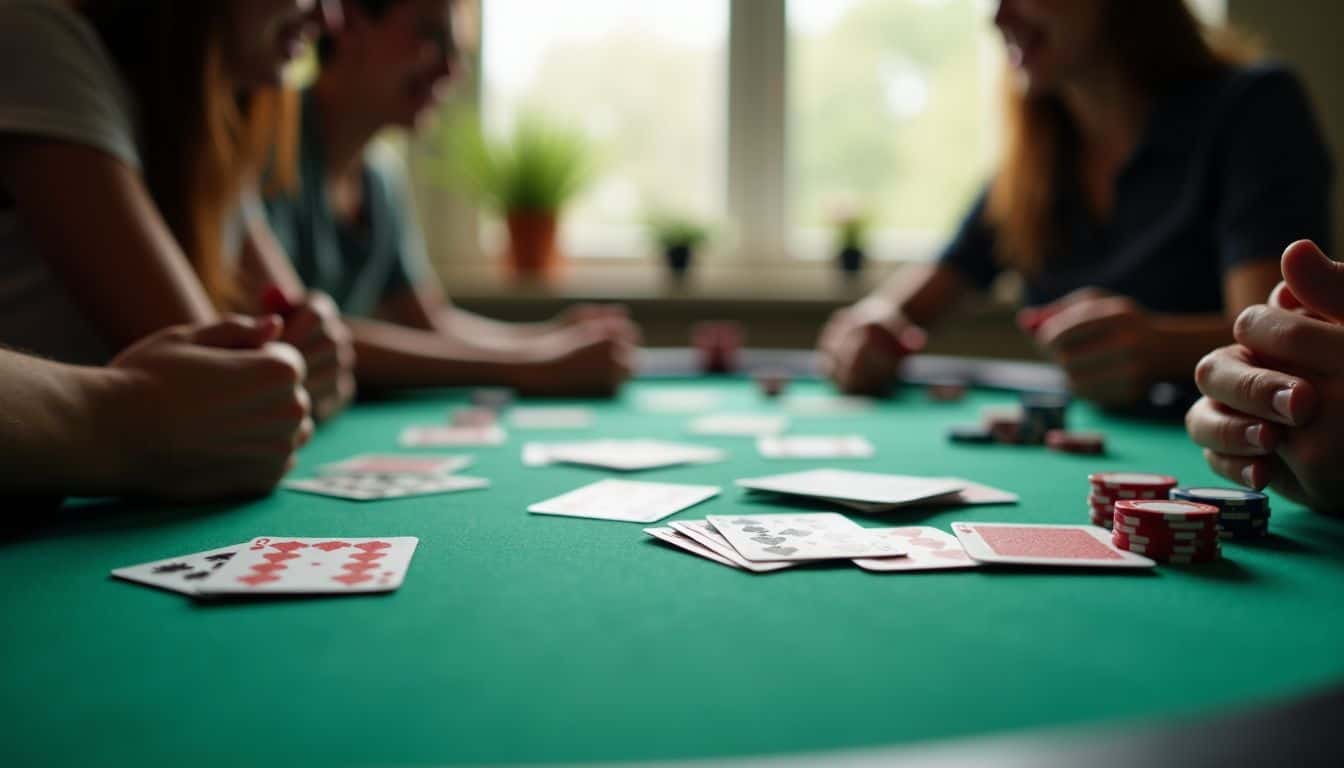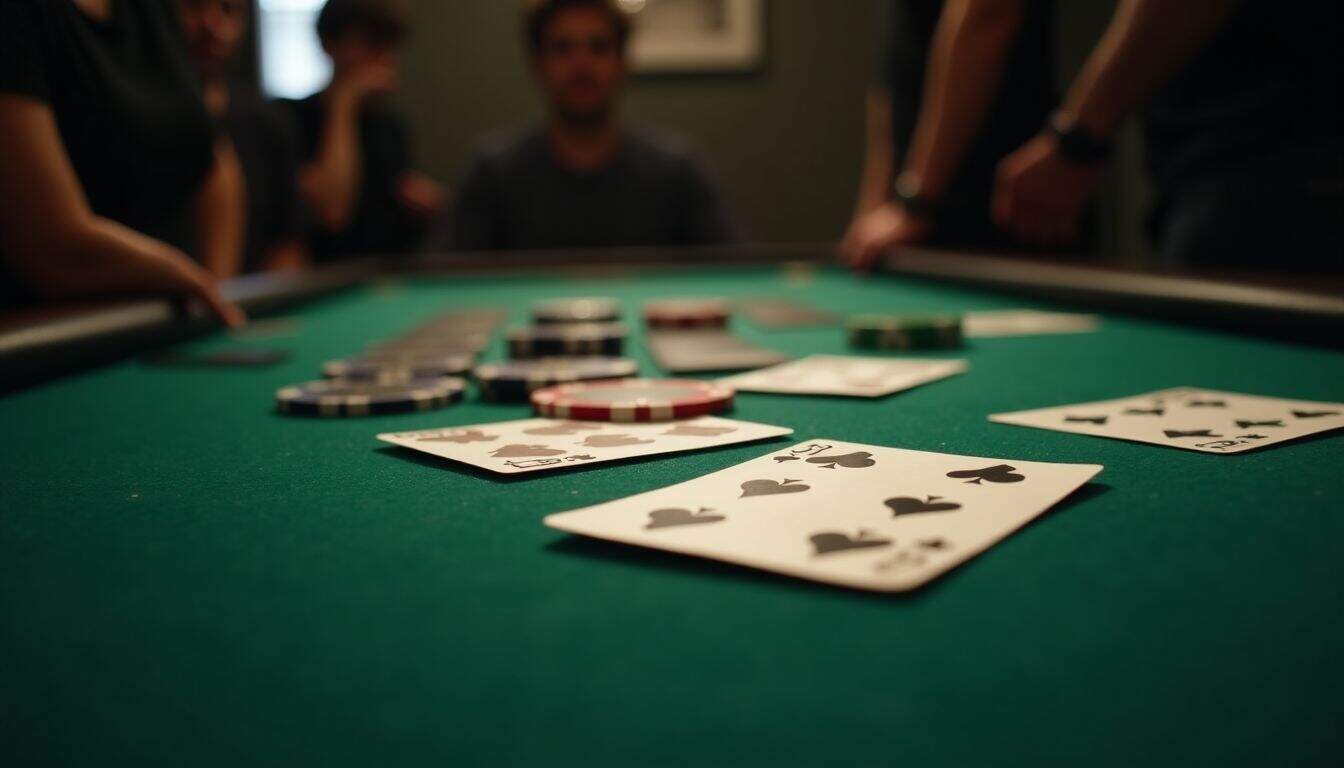Do you wonder, does poker make you smarter or is it just another game of chance? A 2015 study showed that high IQ scores don’t actually mean better poker skills—instead, decision-making and understanding risks matter more.
This post will clearly show the real brain-boosting perks poker players gain and how these can sharpen your mind in daily life. Keep reading—you may be surprised by what this simple card game can do for your brain!
Key Takeaways
Poker sharpens your decision-making skills under pressure—a 2015 University of Alberta study found that having a high IQ alone doesn’t ensure success at poker.
Regular poker sessions boost your math skills and memory; you’ll get quicker at figuring out odds and percentages in everyday situations.
A study by Dr. Jeffrey Cummings suggests poker can lower Alzheimer’s risk by up to 50%, as the game keeps your brain active and strengthens nerve connections.
Poker helps you gain better emotional control and toughness—you’ll stay calm even when things don’t go your way, both at the poker table and in daily life.
Skills gained in poker easily carry over to business—improving your negotiating power and making you sharper at spotting subtle social signals.
Table of Contents
The Cognitive Demands of Poker

Poker tests your brain in ways few games can match. Every hand forces you to make tough choices with limited facts while tracking odds and reading other players.
Decision-making under uncertainty

Playing poker sharpens your brain to make smarter decisions without complete information. At the table, you act on limited facts—just your own cards and clues from opponents’ behavior.
Author Maria Konnikova highlights how poker helps improve our daily life choices under uncertainty. After playing regularly for about six months myself, I noticed quicker, better decisions at work.
Each day, our brains tackle roughly 35,000 decisions—poker practice fine-tunes that process.
In real life, we often must evaluate risks without all the data; poker trains you to do exactly that. You learn to calculate pot odds, interpret subtle body language, and manage your emotions all at once.
Interestingly, high intelligence doesn’t always mean poker success—a 2015 University of Alberta study involving 100 players confirmed this fact. Rather, poker benefits players who stay calm under pressure and adjust smoothly to sudden changes.
Such abilities easily transfer into business negotiations or everyday personal decisions.
Poker doesn’t just teach you about cards; it teaches you how to make decisions when you don’t have all the answers. – Maria Konnikova
Strategic thinking and planning

Poker sharpens your ability to plan several steps ahead—similar to how chess experts plot their moves. At the poker table, you carefully craft strategies from limited clues, adapting as new cards appear and betting changes.
A study involving 35,000 online poker participants found that top players are skilled at quickly analyzing strategy in real-time. Rather than merely reacting, they form plans extending across multiple rounds of betting.
This ability transfers easily into everyday life, where you often must decide based on partial details. Texas Hold’em enthusiasts regularly strengthen this skill, crafting clear paths to wins through community cards and others’ reactions.
Great poker players stay flexible and difficult to predict by closely studying opponents’ behaviors. Success here demands a sharp mind and quick thinking. Expert pros like Johnny Chan observe more than just their own hand—they notice tiny details and betting tendencies from opponents.
Faced with unexpected changes, these players swiftly adjust their strategies, a powerful asset in poker as well as business. This ongoing mental training boosts key thinking skills—useful in numerous real-world situations.
Next up, let’s check out how poker can boost your memory skills and ability to recall information.
Probability and risk assessment

Playing poker sharpens your ability to understand odds and place smart bets with limited information. At the table, you quickly estimate whether your hand holds a 20% or 60% chance of winning, then decide if the pot justifies your bet.
These math skills carry over naturally into everyday life—Nate Silver credits poker for his strong risk-assessment mindset. In fact, a 2015 study from the University of Alberta showed that poker math isn’t complicated rocket science, but simple number-crunching that strengthens your brain’s problem-solving skills.
Managing risk in poker reflects many everyday and professional decisions. You become good at balancing possible profits against the chances of loss—something stock traders and business executives regularly do.
Through practice, you begin to notice if fear is pushing you into hasty decisions, or if others are letting emotions override logic and facts. These insights stick around, well after you’ve left the poker table behind.
How Poker Enhances Mental Skills

Poker sharpens your brain in ways few other games can match. Each hand trains your mind to process complex data, recall patterns, and make quick math choices while staying laser-focused.
Improved memory and recall

Your brain gets a solid workout every time you sit down at the poker table. Research shows even one hour of poker sharpens memory skills in both beginners and experienced players. The game pushes your mind to quickly absorb new details and store them effectively for later recall.
You’ll need to track cards, watch player tendencies closely, and remember betting patterns—all great training for your mental muscles.
This memory improvement doesn’t fade away overnight either. Regular practice at poker deepens your long-term ability to store and recall information, much like exercising a muscle regularly builds strength.
The mental challenges of Texas Hold’em force your brain to form new neural connections, similar to how physical workouts boost muscle power.
These enhanced memory and concentration skills can even help you appear smarter in everyday situations. Sharper focus and a longer attention span can benefit you far outside the poker room, from work meetings to casual conversations with friends.
Strengthened focus and concentration

Poker is a game that demands your complete attention for hours at a time. In Texas Hold’em, players need to track many details simultaneously—like card odds, betting patterns, and opponent reactions.
Doing this mental juggling act regularly makes your brain stronger at maintaining concentration—even under pressure. Constantly analyzing betting habits, figuring out odds, and observing facial expressions builds sharper mental skills.
Many regular players even notice better focus in daily life tasks after playing poker often.
These improved concentration skills don’t just stay at the poker table—they also apply to everyday life. Learning poker helps you tune out distractions and focus clearly on what’s important.
Research indicates that frequent poker players develop longer attention spans over time. This sharper focus improves your problem-solving ability both at work and at home. The discipline you learn while playing can help you navigate complicated choices, such as understanding the best hands in poker or handling real-life decisions effectively.
Next up, we’ll look at how playing poker also improves emotional intelligence—a valuable mental tool.
Enhanced mathematical abilities
Playing poker regularly helps sharpen math skills—without needing any complicated formulas. You quickly improve basic arithmetic, just by handling chips, calculating pot odds, and figuring out bet sizes.
After a few months of steady practice, I found my own ability to do quick percentage calculations had noticeably improved. Poker’s simple math quietly builds your practical number sense and your instinct for assessing probabilities in everyday situations.
Doing well at the table means mixing solid math skills with smart betting decisions.
Texas Hold’em is great for learning risk management through real-time practice with statistics. Players quickly pick up basic probability concepts—they’re essential for making good choices under pressure.
The math itself stays simple: mostly adding, subtracting, and basic probability estimates. This type of mental math training turns out to be helpful in many common life areas, especially whenever split-second number crunching matters.
Evaluating risk at the game table provides a mental workout, strengthening your problem-solving abilities in all sorts of daily decisions.
Emotional Intelligence and Poker

Poker tests your cool under fire, teaching you to mask feelings while reading others at the table – skills that pay off in work and life. Read more to learn how poker can boost your EQ and help you stay calm when stakes are high.
Controlling emotions under pressure
A poker table can feel like a pressure cooker, testing your ability to stay calm under stress. Players with strong emotional intelligence keep their cool, even if the cards go against them.
They make strategic decisions rather than angry moves. At the table, you must control your emotions—concealing your tells, coping with frustration, and staying focused despite money pressures.
This kind of self-control helps build mental strength, useful in real-life challenges too. Top Texas Hold’em players don’t lose their heads after tough losses; instead, they analyze calmly and shift their focus forward.
Your feelings directly shape your choices during critical moments. Skilled players think things through carefully instead of acting on impulse—a clear sign of strong emotional smarts.
They handle setbacks without allowing irritation to take control. This habit improves your problem-solving skills outside the poker game. Facing a challenging deadline at work, or perhaps a personal issue—or maybe dealing with both at once—this same emotional control can help you stay clear-headed, rational, and effective.
Developing patience and discipline
Patience and discipline are key ingredients for poker success. I’ve found players need exposure to thousands of hands, over time, to really improve. Cards won’t always fall in your favor—but keeping calm after tough losses makes a big difference.
Many beginners give up early, unable to cope with normal ups and downs in results. Texas Hold’em favors those who choose wisely and stick with it, rather than chasing easy money.
Poker doesn’t build character—it reveals it.
Controlling your emotions sets winners apart from losers at the poker table. Understanding what triggers your frustration can stop tilt—that risky condition where feelings, rather than logic, guide your decisions.
I’ve seen talented players go broke after just one unlucky hand pushed them over the edge. The best poker minds let each hand stand alone and avoid dwelling on past errors. Playing poker regularly boosts your emotional smarts by training you to stay calm through natural highs and lows.
Staying composed at poker also helps you handle life’s everyday issues, since a calm mind often makes smarter choices.
Building resilience and handling setbacks
Poker sharpens mental strength in ways few other games can. At the table, you’ll encounter tough losses, bad beats, and unlucky streaks—that kind of pressure can really test your toughness.
Great players don’t break under stress; they keep their cool and avoid emotional reactions like “tilt”. This same control helps in everyday life, too. Poker turns setbacks into valuable lessons, teaching players to treat losses as chances to grow, rather than as failures.
The cards make it clear: everyone deals with disappointment, no matter how skilled they might be.
Improving at poker means bouncing back quickly and learning from mistakes. Players who admit their errors and study their play usually get better faster than those who just blame luck or fate.
This ability to recover pays off beyond poker—in business, personal relationships, and daily life. Men who play poker regularly tend to build thicker skin against disappointment.
They develop clear emotional awareness, helping them tell momentary setbacks from lifelong failures, and make smarter decisions—even after losing chips, money, or pride.
Real-Life Applications of Poker Skills

Poker skills move from the card table to your daily life with ease. You’ll spot these mental muscles working when you make tough choices at work or strike deals that favor your position.
Improved problem-solving in daily life
Playing poker sharpens real-life problem-solving. Ever since I started playing cards, I’ve seen my everyday choices get smarter. The game trains your brain to quickly spot risks and choose the best option.
Poker players must decide fast, even when information is limited—just like real-life difficulties we all face. Your mind learns to think several moves ahead, improving how you handle everything from work tasks to household finances.
The true test of a poker player isn’t at the table, but in how they handle life’s uncertainties.
Skills learned from poker also come in handy in daily life. Players get better at understanding situations and noticing people’s feelings, helping to resolve issues at work and home.
This improved social awareness, combined with sharper decision-making, builds a strong mental skill set. Regular card players often say they feel more confident handling tough situations due to the game.
Staying calm and thinking clearly under pressure becomes natural, making day-to-day problems seem more like chances to grow.
Better negotiation and business strategies
Poker sharpens problem-solving skills that carry right over into business. Sitting at the poker table boosts your ability to read people and spot bluffs—skills you need in any negotiation.
It also helps you weigh risks carefully, letting you anticipate your opponent’s next moves—just like sizing up the other side in a business deal.
The skills needed to win at poker aren’t that different from what makes you successful in business. Interviews, salary negotiations, and even project assignments draw on many of the same strategies required in poker.
After years spent around poker tables, I’ve personally noticed a clear growth in my negotiation skills. The game prepares you to stay calm and collected under pressure, and to quickly decide whether to pull back or push harder.
Poker players rely on these methods to stack more chips; businesspeople use them to land stronger agreements. Over time, your emotional intelligence sharpens as you pick up subtle shifts in how others speak, move, or react during tense moments.
Enhanced social and observational skills
Playing poker regularly can sharpen your ability to read people, a skill you can easily transfer into everyday life. At the table, you become alert to subtle shifts—minor changes in facial expression, slight adjustments in posture, or variations in betting behavior.
These observations slowly boost your social awareness, helping you catch non-verbal signals that others often overlook. After a few months of consistent playing, I personally felt more tuned in to social dynamics and better at judging moods within groups.
The game pushes your brain to build fresh neural connections, enabling quicker and more precise processing of social signals.
Your powers of concentration, meanwhile, get a real boost during each session. You’ll need to closely track multiple opponents, understand their habits, and respond quickly—all while keeping your own emotions stable.
It’s like a mental fitness routine, training your mind to manage complex social exchanges smoothly. Many regular poker players even notice they become more empathetic and better communicators over time.
By practicing the skill of sorting useful details from distracting noise, you become naturally skilled at spotting what really matters—in business settings, relationships, or casual social gatherings.
The Long-Term Benefits of Playing Poker

Poker trains your brain for life-long mental fitness, much like a gym workout builds muscle. Regular play might help ward off memory loss and keep your mind sharp as you age.
Potential to delay cognitive decline
Playing poker regularly can help keep your brain sharp as you get older. A study by Dr. Jeffrey Cummings showed that people who play poker frequently reduce their risk of Alzheimer’s by 50 percent.
That’s because poker is like exercise for your brain—it strengthens neural connections linked to making smart decisions. Since joining weekly poker nights with my friends, I’ve noticed that my own mental sharpness has improved.
The cards push my mind to constantly solve problems, assess risks, and weigh different possibilities. Over time, your brain physically changes—making stronger networks in areas tied with decision-making and emotional control.
But poker alone shouldn’t be your only brain exercise. Instead, combine poker with other mental games to get the most protection against age-related decline. Poker’s mix of math calculations, memory practice, and social awareness creates an ideal blend of mental benefits.
At my local card room, I’ve seen many players in their 60s and 70s show impressive mental sharpness compared to non-players. The game’s continuous demands for focus and reasoning powers build a mental reserve, which helps protect against mental slowdown later in life.
Fostering a growth mindset
Poker helps shape a growth-focused mindset, making your brain stronger with every hand you play. I’ve watched players completely transform their thinking by prioritizing effort over results.
Sure, cards don’t always go your way—but the real power lies in how you handle tough breaks. Elite players often measure the quality of their decisions rather than counting wins alone.
This habit trains your brain to focus on steady improvement, instead of depending purely on luck. It’s similar to Texas Hold’em situations, where adjusting quickly matters as table conditions shift.
Men who take poker lessons to heart start seeing challenges as opportunities to learn. Poker pushes you to view mistakes as helpful feedback—not personal setbacks—and that mindset goes a long way.
Friends of mine who enjoy small victories and stay open to learning from defeats become sharper problem-solvers. Their attitude easily transfers into jobs and personal relationships, helping them read and manage emotions clearly.
As you regularly practice patience and grit through tough stretches, your brain gets a solid workout. Over time, that mental strength helps fight cognitive decline and boosts overall brainpower.
Encouraging continuous learning
Playing poker means always learning and growing. With each session, you study fresh strategies, adjust to new opponents, and glean valuable lessons from every hand. This steady need to improve sharpens your mind, creating habits that help you absorb knowledge faster.
In fact, research shows poker players tend to become quicker learners in many areas of life. Every mistake at the card table turns into another chance to grow—even better than a classroom.
Your brain loves challenges like these. Each poker round makes you weigh new info and shift your thinking. Regular players often feel more confident handling tricky problems at work.
The game blends numbers, psychology, and strategy into a powerful skill-building experience. Facing constant mental puzzles at the table keeps you sharp—strengthening your mind in ways that benefit you in daily life.
Do You Need to Be Smart to Play Poker?

While raw intelligence helps, poker success depends more on skills you can learn through practice – like reading people, managing money, and making quick choices – so grab a seat at the table and see how your brain might level up!
The role of IQ versus learned skills
Plenty of people assume you need extraordinary brainpower to do well at poker—but research disagrees. Studies show little connection between high IQ and poker-winning success. Players with average or mildly above-average intelligence often make strong showings at the table.
Instead, consistent practice and learned skills matter far more. Texas Hold’em champs have emerged from diverse backgrounds and educational histories.
Poker favors mastered skills over natural smarts. Abilities like judging probabilities, calculating risks, and understanding emotions all improve with practice. Each hand played helps sharpen your mental strength.
The great thing about poker is balance—it takes enough smarts to learn basic ideas, but success mostly depends on skills you build. That’s why almost anybody willing to put in the time can succeed, no genius IQ required.
Adaptability and learning in poker
Poker pushes you to quickly switch gears. I’ve watched new players become sharp thinkers after just a few months at the table. Each hand gives new information, forcing your brain to adapt fast.
This mental exercise boosts what experts call “need for cognition“—basically, your love for deeper thinking. Players constantly adjust to shifting opponents, varying table situations, and fresh strategies.
These repeated adjustments sharpen problem-solving skills that transfer easily into daily life.
The game’s beauty is its steady learning path. Studies confirm both experienced and novice players sharpen their thinking abilities through regular poker play. Your brain improves at making good decisions under pressure.
A Texas Hold’em player who can’t shift strategies quickly loses money. I’ve seen close friends gain impressive emotional intelligence by carefully observing opponents and controlling their own emotions.
These new skills can slow cognitive decline—and might even help protect against Alzheimer’s disease. Poker trains you to quickly weigh risks, a valuable skill at work, during business negotiations, and even in everyday decisions.
How Will Poker’s Impact on Cognitive Development Evolve in 2025?

Brain training using poker will hit new levels by 2025. Experts say poker apps will soon offer exercises that sharpen decision-making and probability skills. These apps could even track your mental sharpness over time, clearly showing how regular poker play helps fight cognitive decline.
Digital tools will soon capture your emotional reactions during games, too—helping you manage your feelings at the poker table. I’ve already seen this start myself; my own poker training app now advises short breaks if my play signals tiredness or tilt.
Social connections in poker will also become more valuable. Virtual reality poker rooms will soon allow people worldwide to host a poker night from their own homes.
This tech shift will create fresh ways to enhance social skills while providing a solid mental workout. Schools will bring Texas Hold’em and Omaha games into some classrooms as teachers see poker’s value for teaching math, risk awareness, and problem-solving—all wrapped neatly into one enjoyable game.
In these educational setups, gambling concerns step aside, giving center stage to poker’s proven cognitive benefits.
People Also Ask
Does playing poker raise your IQ score?
Poker won’t directly improve your IQ test numbers—but it does sharpen your problem-solving and decision-making abilities. It trains your brain to think about probability, assess risks, and make smarter choices.
How can poker boost emotional intelligence?
Poker helps you manage your emotions and reactions during tense moments. It also teaches you to notice subtle emotional cues from opponents—while controlling your own feelings—which translates into stronger social skills in daily life.
Can playing poker lower risks of Alzheimer’s?
Regular mental activities—like Texas Hold’em poker—can help keep your brain sharp over time. The memory and thinking challenges involved might support healthy brain function as you age.
What personality skills can poker build?
Poker can strengthen traits like responsibility, discipline, and leadership. Players regularly make tough calls under pressure, carefully weigh risks, and use creative thinking to anticipate how their opponents might act.
Is poker all about luck—or does it really require strategy?
Poker isn’t like craps or baccarat—purely games of luck. Poker relies heavily upon strategy, mental skills, and thoughtful moves. You need to clearly grasp rules, calculate odds accurately, and place bets based on probability—not just chance.
How does poker measure up against other brain-training games?
Poker provides unique benefits because it combines math, psychology, and careful strategy. Standard brain-training exercises usually involve straightforward puzzles or memory tasks. Poker, on the other hand, makes you tackle complex problems with limited information, while staying calm through emotional ups and downs of wins and losses.
References
- https://www.linkedin.com/pulse/decision-making-under-uncertainty-dr-artus-ph-rosenbusch-lk6be
- https://neurosciencenews.com/strategic-thinking-poker-9350/ (2018-06-15)
- https://neurolaunch.com/is-poker-good-for-the-brain/
- https://www.newpelican.com/articles/what-skills-can-you-learn-from-playing-poker/
- https://pokerpower.com/how-poker-improves-cognition/ (2023-03-23)
- https://exodusoutdoorgear.com/pages/gallery?advanced-techniques-for-elevating-your-poker-game=&srsltid=AfmBOoqTsIOVOytzb-rRarlIBUesBGECGX5SNpnjzwF9PxDfuxxPVGJ0
- https://pokerpower.com/want-to-raise-your-eq-play-poker/
- https://smartpokerstudy.com/5-mental-aspects-winning-poker-mind/
- https://gentspost.com/life-lessons-from-the-poker-table-mastering-strategy-patience-emotional-resilience/
- https://casino.borgataonline.com/en/blog/the-cognitive-benefits-of-poker/ (2023-05-15)
- https://pokerpower.com/how-to-negotiate-in-business-using-poker-skills/ (2021-10-19)
- https://www.casino.org/blog/poker-growth-mindset/ (2025-02-14)
- https://www.888poker.com/magazine/playing-poker-makes-you-smarter (2024-04-22)
- https://www.cardschat.com/forum/general-poker-13/do-you-need-a-good-iq-531706/page-3

